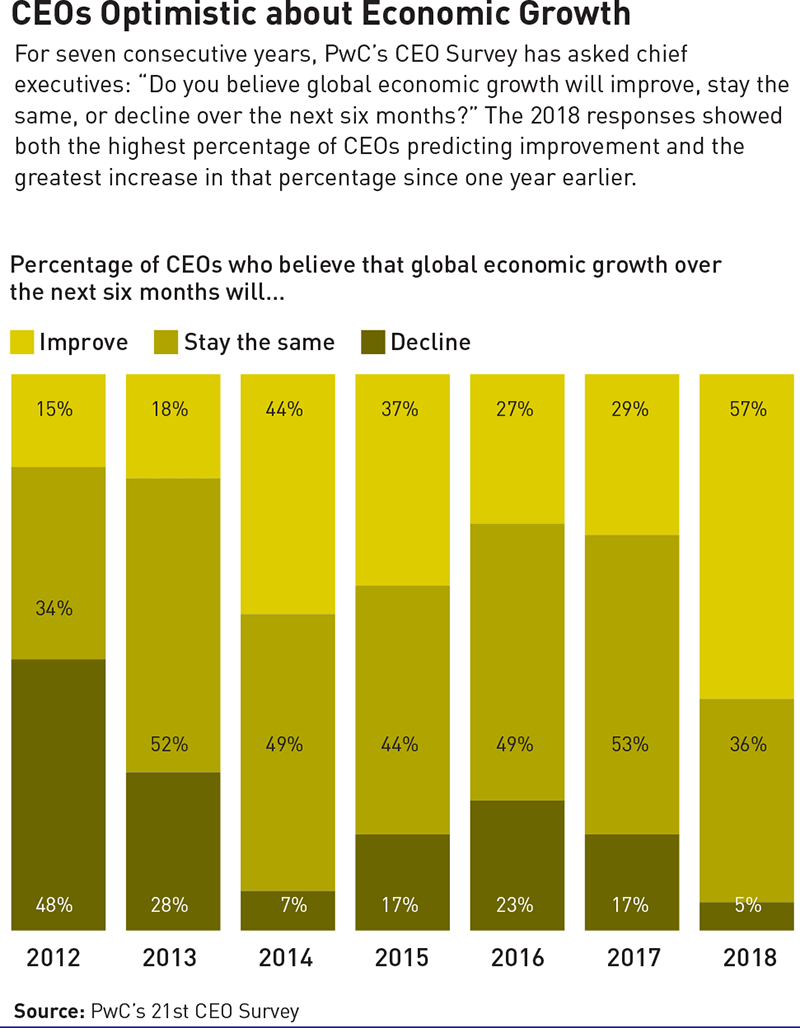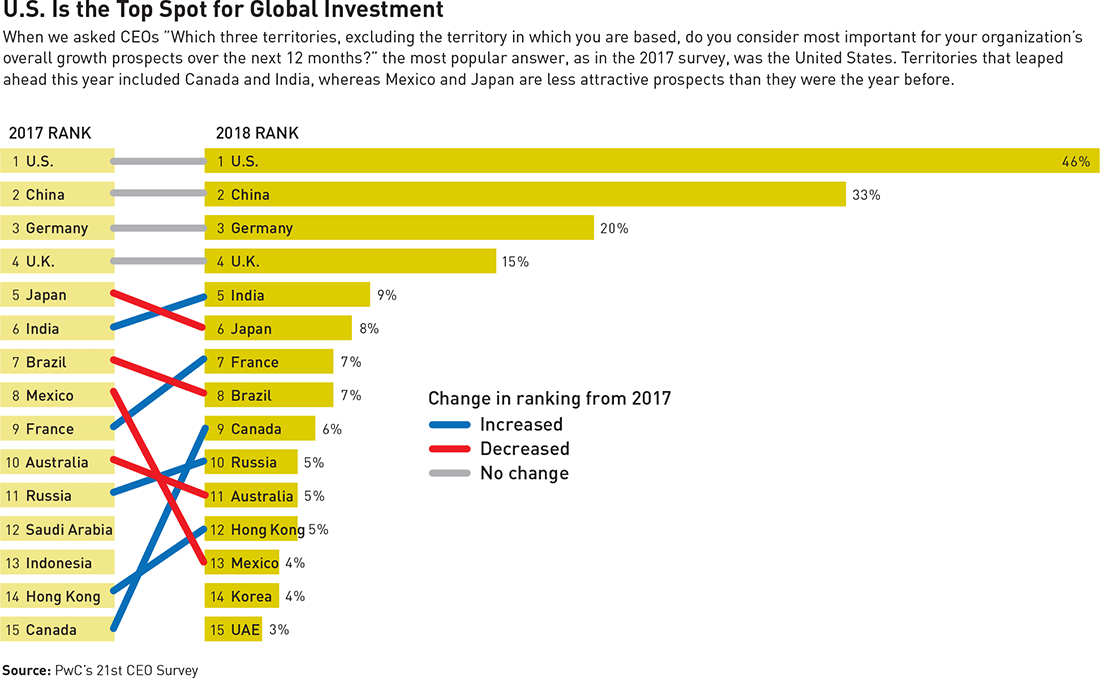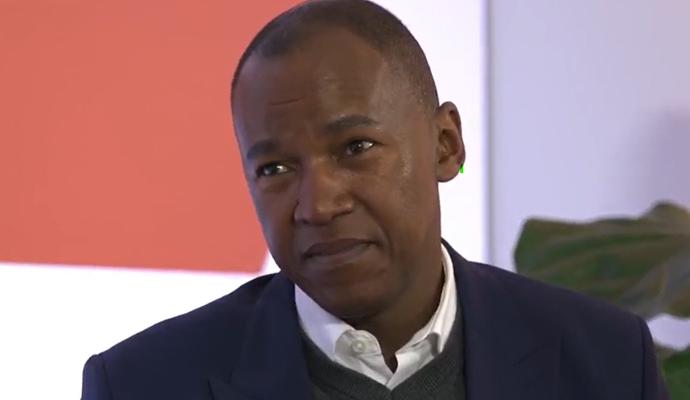Optimism and trust on the CEO’s mind
In PwC’s annual survey of chief executives around the world, respondents voiced confidence about economic growth and greater interest in corporate responsibility.
At first, this year’s optimism surprised us. When we tallied the results of PwC’s 21st annual survey of chief executive attitudes, we found that company leaders around the world were enthusiastically bullish about the global economy. This seemed to clash with the continuous barrage of pessimistic headlines — reflecting, for example, geopolitical uncertainty, corporate misbehavior, and disruptive new technologies such as artificial intelligence. And yet the 2018 survey marked the greatest increase in general CEO optimism regarding overall worldwide prosperity that we have seen in the past seven years. When PwC global chairman Bob Moritz presented the results at the World Economic Forum in Davos, Switzerland, in January 2018, the CEOs there largely agreed. In general, business leaders’ expectations of accelerating economic growth are genuine, broad-based, and linked to global economic fundamentals.
To be sure, the respondents to our CEO survey weren’t as confident about other aspects of the future. They said they were still kept up at night by such threats as terrorism, geopolitical uncertainty, cyber-attack, technological disruption, and populism. That’s why we called the survey’s report “The Anxious Optimist in the Corner Office.” But the most striking result had to do with public attitudes about business. When asked if they perceived declining trust from their customers, only 18 percent of CEOs said yes.
This is not what you hear from other experts on attitudes and trust. For example, the Edelman communications consultancy presented a much less sanguine perspective at Davos. It too produces an annual global survey, the Edelman Trust Barometer, which measures the level of public confidence in the world’s key social institutions: government, business, media, and NGOs. This year, the Edelman survey witnessed no significant global change, but found evidence of noticeable shifts in 12 nations. In six of those countries (China, the UAE, South Korea, Sweden, Malaysia, and Poland), trust dramatically increased, and in the other six (Colombia, India, South Africa, Brazil, Italy, and the United States), it declined. Among the U.S. population overall, trust in institutions declined dramatically — making it the steepest drop ever measured by Edelman in one year for any single country.
How do these two points of view coexist? Are optimistic CEOs desperately out of touch with a deeply distrustful public? Or from their elevated vantage points within their own companies, do they see legitimately brighter prospects ahead as they rise to the challenges of technological, political, and social change? Either way, the tension between global economic growth and wavering institutional trust is clearly one of the most important issues this year. It will not go away, and every business leader must come to terms with it — if only to chart a strategic course for his or her enterprise.
The Trend of Mistrust
When you look beyond the headlines, CEOs have reason to be optimistic. Their opinions are in line with current trends as they project continued economic growth, robust revenues, and higher head count. Indeed, the more optimistic projections of the last two years have been borne out in months of positive and proactive company announcements. Even though stock markets have experienced some sharp drops in 2018 in reaction to talk of trade wars and social media vulnerability, the overall trajectory still appears robust.
The public mistrust of companies is also part of a longtime trend, one of declining respect for all institutions, not just corporations. According to Edelman, the mistrust of media is even greater than the mistrust of business. In the 28 geographies that Edelman surveyed, the overall trust for institutions accrued most to NGOs, then to business, then to government, and finally to media. In 21 of these geographies, business is more trusted than government. In that context, when it comes to dealing with social issues and fostering overall economic growth, people around the world increasingly expect business to step up to the responsibility. Other institutions have lost their license to lead; they aren’t seen as capable of making the right things happen.
Two possible reasons for this shift in attitude come to mind. First, the private sector is now seen as an effective actor when business leaders choose to participate in solving the pernicious problems of our time: cybercrime, terrorism, the threat of nuclear war, income inequality and its political impact, and environmental damage. People do not see other institutions — government, media, and NGOs — as being competent to address these issues without business leaders being involved. Nearly two-thirds of the people Edelman surveyed said they wanted CEOs to take the lead on policy change instead of waiting for government, which now ranks significantly below business in trust in 20 markets.
Second, business operations are more visible than they used to be. The transparency inherent in digital technology has made ethical missteps more obvious than ever — and has heightened the rewards for businesses that prove themselves trustworthy. Building trust in a world of increasingly nationalist politics is especially important for global enterprises that must employ people around the world. The need to work together effectively and graciously, across every boundary including national boundaries, will not go away.
Many business leaders are expressing interest in this challenge. They want to establish a reputation for probity and global leadership; they see that as a source of advantage. But it’s not obvious how to translate this interest into everyday work, especially for companies with missteps or malfeasance in their past. A starting point is to look more closely at current dynamics, and the role business will need to play over the next few years.
Exuberant Executives
It’s worth noting that the 1,293 CEOs in 85 territories who responded to PwC’s survey were basing their optimism on their company’s own steadily improving prospects. In fact, this was the first time since we began asking the question in 2012 that the majority of respondents said they believed global economic growth levels would rise (see “CEOs Optimistic about Economic Growth.”) This record degree of optimism held fast across every region: North America, Latin America, Western Europe, Central and Eastern Europe, Africa, the Middle East, and Asia-Pacific.
The greatest overall increase in exuberance was in North America. In the U.S., nearly 60 percent of CEOs predicted that global economic growth would improve in 2018. A scant 2 percent predicted a decline. Compare that with the previous year, when only 24 percent of U.S. CEOs said they believed the global economy would improve. We found some affirmation of global CEO optimism when we asked leading economists and business thought leaders to comment on the survey findings. Glenn Hubbard, economist and dean of the Columbia Business School, observed, “We are in a cyclical recovery that has been going on for many years since the financial crisis. People have gotten more optimistic. I think in most parts of the world, CEOs believe that changes in policy are going to continue to improve growth.”
Other commenters wondered if the CEO optimism was justified — or even if it could lead to overconfidence and complacency, and thus be a leading indicator of crisis. “Is this a real recovery or just a short-term blip?” asked economic historian Carlota Perez. “Historically, when there is a real transition into prosperity, everybody feels it. I hope leaders don’t believe this recovery is permanent. It is just a little breathing space before difficult times return.”
The most experienced chief executives who responded to our survey might disagree; they appear to have factored this skepticism into their views. Those who have been in office longest — 11 to 25 years — are rosiest in their assessment of the global economy and their own organization’s prospects. They’ve weathered previous storms and perhaps recognize that there are opportunities ahead, no matter what happens next.
It’s also noteworthy that the U.S. pulled further ahead of China this year as the place CEOs feel has the most attractive growth potential (see “U.S. Is the Top Spot for Global Investment”). These two nations have vied for supremacy with respect to this survey question for years, and China held the lead until 2015. Since then, CEOs have favored the U.S. over other countries as a growth market, but never by so wide a margin as they did this year. (The survey parameters do not permit a CEO to vote for the country in which his or her company is based, so U.S. CEOs did not participate in this vote of confidence.)
Edelman’s 2018 Trust Barometer again paints a very different picture. Its survey results found trust levels in the United States plunging 37 points across all institutions: government, business, media, and NGOs. Confidence in the government fell off a cliff — dropping a remarkable 30 points — among the group Edelman calls the “informed public”: college-educated people age 25–64, in the top 25 percent of household income, who said they followed news and current events in the media. This decline in confidence in government is no doubt related to this group’s skepticism about the Trump administration, and perhaps about the ability of any government to solve the complex problems facing humanity.
The Next Steps for Business
These findings help explain why a call for greater social responsibility by business was the primary theme at the 2018 World Economic Forum meeting — and a major theme in our survey. Trust in institutions is closely linked to economic growth. It is well established that when people perceive that their lives are getting better, they are more likely to trust institutions, even if they live under authoritarian regimes. In that context, it’s reasonable to think that business can play a larger role than it has in the past, raising global prosperity and the quality of life in the places where it does business.
When asked about the obligations associated with trustworthiness, the majority of CEOs voiced a sense of responsibility. They feel a growing expectation from their stakeholders that they should speak up on behalf of the overall health of the economy, the importance of diversity within their companies, and other social and environmental issues. Moreover, 59 percent said they experienced pressure to hold individual leaders accountable for misconduct. This was the second-most prevalent pressure they felt, only one percentage point behind the pressure for short-term financial results. In the third-most prevalent answer, 38 percent of the CEOs around the world said that they were experiencing pressure from employees and customers to take social or political stances. These pressures were felt much more strongly than, say, concerns about the dwindling tenures of chief executives themselves (only 22 percent).
At the same time, the CEOs by and large rejected the proposition that private enterprise (and particularly their businesses) has lost public credibility. When asked if they measured trust among employees and customers, the majority of chief executives in all regions indicated “yes.” And they were largely pleased with the measurements. Only one in five global chief executives said that trust was declining between his or her workforce and the company’s senior leadership. Even fewer, 18 percent, perceived declining trust from their customers.
Whether they are trusted or not, we expect to hear from more CEOs dealing directly with the challenge of social responsibility in the next few years. The pressure they feel will not go away. Author and political risk consultant Ian Bremmer notes, “I do think that CEOs need to pay more attention to how they are perceived by populations as a whole. Globalism is not just an anti-establishment problem for governments and for political leaders; it’s also a problem for companies, and that is going to get a lot larger. Unless they really want to retreat further behind castle walls, it would behoove CEOs to become part of the solution.”
How can business leaders translate this imperative into day-to-day action? There may be a clue in another finding of the survey. The CEOs were optimistic about the world at large. But when asked about their own organization’s revenue growth prospects, they tended to say they were “somewhat confident” rather than “very confident,” especially considering the next three years. Particularly restrained were CEOs in the Middle East and Central and Eastern Europe, where “very confident” responses reached near-record lows, down 33 percent and 26 percent, respectively, from the year before.
Here again, North America was an optimistic outlier. It was the only region where a majority of CEOs (53 percent) demonstrated the highest possible level of confidence in their company’s revenue growth prospects over the next 12 months. The last time U.S. CEOs were this exuberant was in 2007, the year before the global financial crisis.
Managing the Future
The link between trustworthiness and financial confidence is subtle, but consistent. Trustworthiness depends not just on good intentions, but on competence: on having the kind of internal practices and culture where internal leaders are aware of potential lapses, encouraged to voice them, and given the tools to fix them. We know many companies that have fallen from grace, either through their own missteps or through fierce and disrupting competition. Some stay down; others bounce back. What distinguishes those that bounce back? This is a question we hope to return to, with answers we expect to keep refining over the next few years, at strategy+business and PwC. But for the moment, we have identified some basic practices that can help chief executives carve out a meaningful, trusted identity for themselves and their enterprises.
Your primary way of building trust as a business leader is by doing what the most successful businesses have always done: fostering widespread prosperity.
The first and most important is to take seriously your choice of principles to follow, and your limits in following them. Pick just one or two places to take a stand — and take care your constituents and leaders can embrace those positions. Any political or social stand that a company takes will inevitably be tied to its identity. If you head a large global organization, you will undoubtedly have people among your leadership and staff from a wide variety of national, ethnic, religious, and educational backgrounds, and a variety of political affiliations as well. Whatever promises you make should be possible to achieve, and relevant to most people who work in your company.
That doesn’t mean avoiding social responsibility or staying with a tepid, least-common-denominator approach. You may need to educate your board members, managers, employees, and customers on why a particular stand is important.
You will then need to back up your stand with action — and the more consistent and relevant that action, the more credibility you will have. You undoubtedly know that people watch not just what you say, but also what you do. They also watch where you pay attention. Being trustworthy requires a level of homegrown discipline, for yourself and for your top team, that is practiced enough to be second nature — so that you’re prepared when you have to be.
There will be times when you and your organization do not measure up to the stand you have taken. That is why you need to cultivate a culture of forgiveness, so that people are not pilloried for falling short. And you need to cultivate a spirit of learning throughout your organization, so people can continually sharpen their ability to do better in the future.
Finally, your primary way of building trust as a business leader is by doing what the most successful businesses have always done: fostering widespread prosperity. You do this not just by offering products and services, but by channeling your investments and managing your operations with the more broadly aspirational goals of fostering quality of life and general economic health in the places that matter to you. This inevitably means questioning practices that have become second nature to your company in terms of whether others could legitimately see your business as exploiting its customers or neighbors because of those practices.
The CEOs we surveyed seem to understand this. They know that they have the agency to become more trustworthy, as business leaders and as companies. They know how great a challenge it will be, and they are daunted by the prospect in many cases. But a growing number of them seem to feel, no matter which part of the world they call home, that in the long run they have no other choice.
Author profile:
- Art Kleiner is the editor-in-chief of strategy+business. As editor-in-chief of PwC global thought leadership, he was on the team that created the report described in this article.
- Also contributing to this article were PwC global marketing and insights director Ilona Steffen, campaign managers Spencer Herbst and Valerie Jambart, and contributing writer Tara A. Owen.






